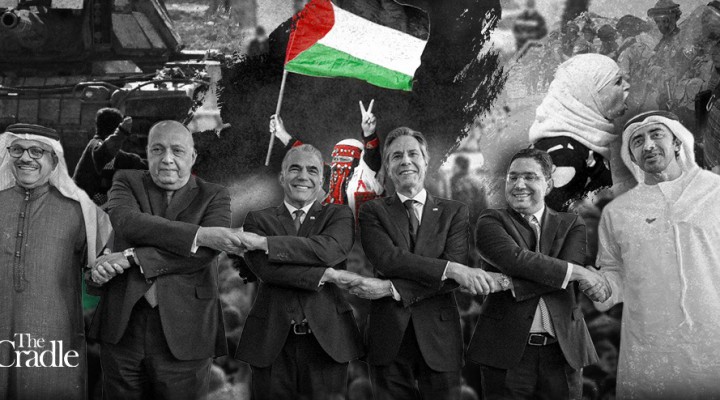The Negev Summit wants an Arab-Israeli ‘NATO’ to confront Iran, but is unlikely to succeed

The Negev Summit saw an unprecedented level of Arab-Israeli security cooperation to counter the Axis of Resistance, but took place against the backdrop of a seismic shift in the global balance of power. Is it dead on arrival?
Of the three summits held in the past five days in the Negev, Sharm el-Sheikh, and Aqaba, Israel’s was arguably the most prominent, with the aim of crowning it as a leader of the region and establishing an Arab-Israeli NATO equivalent, a by-product of the Abraham Accords signed in 2020.
The ‘historic‘ summit held in southern occupied-Palestine which wrapped up on Monday is expected to lay the “foundation stone” for the new alliance. It is the fifth to take place, in the presence of US Secretary of State Anthony Blinken and his counterparts from Egypt, the UAE, Morocco and Bahrain, and the host country, Israel.
This development is especially concerning, because it involves an official Arab public embrace of the occupying power at all levels, linking Israel’s security with the Arab governments participating in this summit as a counterweight to the Iranian-led ‘Axis of Resistance’.
United against Iran
The mutual fear, driving the participants of the Negev Summit are based on the possibility that the Vienna negotiations will result in a new nuclear agreement with Iran, the most prominent of which is the lifting of all sanctions, recognition of Iran’s regional role, the lifting of the estimated $100 billion in frozen Iranian assets, with compensation of up to $200 billion, and significantly, the removal of Iran’s Islamic Revolutionary Guard Corps (IRGC) from the US ‘foreign terrorist organization’ (FTO) list.
For the summit to have lasted for two days, it is likely that that there was an agenda for a tightly prepared alliance charter, a joint defense treaty, and a military security field action plan. It has since been reported that the UAE, Bahrain and Morocco expressed interest in acquiring Israel’s Iron Dome defense system during the talks.
There can be no denying that Iran and its allied armed forces in the region, pose an existential threat to the Israeli occupation state — which is in our interest as Arabs, but what danger does it pose to 110 million Egyptians, or to Morocco, which is more than 5,000 kilometers away?
‘Summit of Shame’
This summit, which has been branded as by Palestinian factions as the “summit of shame” is envisioned to become an annual or biannual event and will be instrumental in paving the way for an Arab-Israeli ‘NATO.’ This, tragically, will entail the fragmentation of the Arab world and could only prove fatal for the Arab League, not to mention the question of Palestine and the Judaization of Jerusalem.
It was a painful sight to witness Arab foreign ministers participating in the Negev Summit, near the tomb of David Ben Gurion, the founder of Israel. Ahead of the summit, it was even reported that a visit to his grave was part of the itinerary, although it was not confirmed if all of the Arab officials participated. Nevertheless, it wouldn’t at all be surprising if they were to lay a wreath above it in honor or read fatiha for his soul.
It is the pinnacle of humiliation and submission – has an Israeli or US official ever visited the mausoleum of the Egyptian leader Gamal Abdel Nasser?
Shifting sands?
The emergence of the Israeli occupation state as the leader of the budding regional alliance is a major set-back for those opposed to the Zionist project. However, this alliance will not succeed in confronting Iran and the Axis of Resistance, nor will it be able to dispel the security concerns of its member states. Iran’s recent missile strikes on an alleged Mossad facility in Iraqi Kurdistan for instance served as a bold warning against any future seditious activities by hostile states.
Condemning the “conference of evil” on Monday, the spokesperson for Iran’s Foreign Ministry Saeed Khatibzadeh, announced that Tehran was prepared to work with other regional countries in order to counter the US-Zionist plot intent on creating division and instability in West Asia.
This comes amid a string of political defeats for the US in Iraq, Afghanistan, Syria and Venezuela. Washington is no longer the world’s sole superpower and this has most recently been exemplified in the Ukraine war, with its abandonment of its allies and NATO’s failure to respond strategically in its proxy conflict against Russia.
With regards to the West Asian region, there has also been a failure by the west to win over support from Arab states in isolating and sanctioning Moscow. It is perhaps the wrong era to be establishing an alliance inspired by NATO, in light of current events.
It is imperative that other Arab countries not party to this Israel-led bloc break their silence and move quickly to form a unified Arab-Islamic front, in order to defend themselves and the interests of the ummah. Specifically, we are talking about Syria, Iraq, Yemen, Lebanon, Palestinian resistance factions, but also Algeria and some Gulf states that have not yet declared their position, such as Kuwait and Oman.
This alternative alliance to the treacherous one convened in Negev will have the backing of a regional power in the Islamic Republic – potentially with nuclear capabilities – and an international nuclear-powered Sino-Russian alliance preparing to upset the status quo and international order as we know it.
 TheAltWorld
TheAltWorld 
0 thoughts on “The Negev Summit wants an Arab-Israeli ‘NATO’ to confront Iran, but is unlikely to succeed”